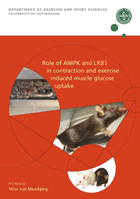PhD defence: Role of AMPK and LKB1 in contraction and exercise induced muscle glucose uptake

Stine Just Maarbjerg
PhD thesis
Physical exercise plays an important role in prevention and treatment of type 2 diabetes
In response to physical exercise glucose uptake increases markedly in the active muscles. Importantly this ability to increase glucose uptake during muscle contractions is preserved in people with insulin resistance and type 2 diabetes, which are both characterized by impaired insulin stimulated muscle glucose uptake. Consequently the mechanisms responsible for contraction and exercise induced muscle glucose uptake are potential therapeutic targets regarding the ever increasing number of people with type 2 diabetes worldwide.
Increase in AMP-activated protein kinase (AMPK) activity is causally linked to muscle glucose uptake in response to treatment with the pharmacological agent AICAR. As muscle AMPK activity, similar to muscle glucose uptake, increases in an intensity dependent manner, it was been hypothesis that AMPK is responsible for the increase in glucose uptake during muscle contractions.
The present PhD thesis provides a review regarding the current understanding of AMPK and the upstream kinase of AMPK, LKB1, in regulation of muscle glucose metabolism. In three studies using three different transgenic mouse models to impair AMPK signaling, this thesis explores the role of AMPK and LKB1 in muscle glucose uptake during contraction and physiological exercise in mice. The results obtained in the three studies are finally discussed in context with the recent progress in the field of AMPK and LKB1 in regulating muscle glucose uptake.
2011, 155 pages, DKR 100,-
ISBN: 978 87 917 7136 1
Time
Friday July 1, 2011 at 14.00 o'clock
Place
Auditorium 1, August Krogh building, Universitetsparken 13, Copenhagen
Opponents
Professor Ylva Hellsten (chair), Department of Exercise and Sport Sciences, University of Copenhagen, Denmark
Professor Jørgen Jensen, Norwegian School of Sport Sciences, Oslo, Norway
Doctor Kei Sakamoto, MRC Protein Phosphorylation Unit, The Sir James Black Centre, University of Dundee, United Kingdom
Supervisor
Professor Erik A. Richter, Department of Exercise and Sport Sciences, Faculty of Science, University of Copenhagen, Denmark.
